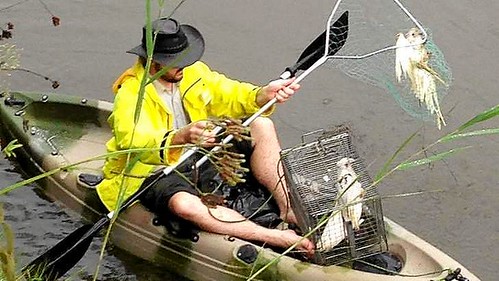 A volunteer plucks out a dead little corella from waters near Dubbo. Photo: Louise DongesA chemical used to control insects and non-native pest birds is likely to blame for the deaths of hundreds of wild birds near Dubbo in the state's central west, the NSW Environment Protection Authority said.
A volunteer plucks out a dead little corella from waters near Dubbo. Photo: Louise DongesA chemical used to control insects and non-native pest birds is likely to blame for the deaths of hundreds of wild birds near Dubbo in the state's central west, the NSW Environment Protection Authority said.
As many as 700 birds, mostly little correlas, galahs and sulphur-crested cockatoos, have been found dead over the past fortnight in a two-kilometre radius of Troy Reserve on the Talbragar River, said Ann Mara, chairwoman of the WIRES wildlife rescue group.
The EPA said testing of samples from the dead birds indicates fenthion, a pesticide commonly used to kill insects, spiders and birds such as starlings, is the most likely cause of the deaths.
"At this point, we do not have evidence as to how the birds came into contact with the insecticide but we are continuing to investigate, Gary Davey, director of the north branch of the EPA said.
"Water samples from the Macquarie River have also been tested and preliminary results indicate that no pesticides have been detected, Mr Davey said.
The Australian Pesticides and Veterinary Medicines Authority last October extended for a year a suspension on the use of fenthion for home gardens and a range of agricultural products, such as eggplants and pears.
Volunteers from as far away as Sydney helped gather the carcasses to prevent raptors, such as whistling kites and tawny frogmouths, feeding on the poisoned carrion. About 30 sick birds, including two kites, have been so far been rescued, Ms Mara said.
"Weve got fantastically beautiful bird populations out here," she said. "This is a significant loss.
Locals found the first deaths on February 27 but were initially prevented from collecting the carcasses out of concern about possible bird flu, Ms Mara said. Five volunteers began the arduous clean-up on March 1 in heavy rain, rescuing two dozen sick birds and about 200 dead birds on that day alone.
Debbie Archer, manager of environmental control at Dubbo City Council, said it was a relief to find the Macquarie River was not contaminated.
"The concern now is for the higher-order birds, such as eagles," Ms Archer said, with snakes also at risk if they feed on poisoned birds.